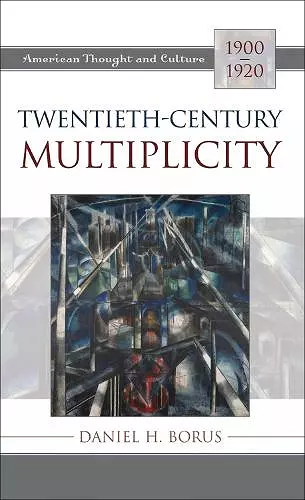Twentieth-Century Multiplicity
American Thought and Culture, 1900-1920
Format:Hardback
Publisher:Rowman & Littlefield
Published:16th Dec '08
Currently unavailable, and unfortunately no date known when it will be back
This hardback is available in another edition too:
- Paperback£41.00(9780742515079)

Twentieth-Century Multiplicity explores the effect of the culture-wide sense that prevailing syntheses failed to account fully for the complexities of modern life. As Daniel H. Borus documents the belief that there were many truths, many beauties, and many values—a condition that the historian Henry Adams labeled multiplicity—rather than singular ones prompted new departures in a myriad of discourses and practices ranging from comic strips to politics to sociology. The new emphasis on contingency and context prompted Americans to rethink what counted as truth and beauty, how the self was constituted and societies cohered and functioned. The challenge to absolutes and universals, Borus shows, gave rise to a culture in which standards were not always firm and fixed and previously accepted hierarchies were not always valid. Although itself strenuously challenged, especially during the First World War, early twentieth-century multiplicity bequeathed to American cultural life an abiding sense of the complexity and diversity of things.
Daniel Borus offers a panoramic and strikingly original account of the dawn of American modernity. The pluralistic impulse that energized every field of inquiry and impelled dazzling innovations in aesthetic form emerges here as the defining feature of early twentieth-century culture. Such familiar figures as Jane Addams and W.E.B. Du Bois receive fresh treatment as critics of art and culture, while Elsie Clews Parsons, Thorstein Veblen, and Walter Weyl finally receive their due as the penetrating progressive theorists they were. The parallels Borus finds between these thinkers' exploration of multiplicity and Charlie Chaplin's silent comedies, Scott Joplin's ragtime, and the 'Little Nemo' and 'Krazy Kat' comic strips are among the many joys of this remarkable book. A model of historical interpretation, Twentieth-Century Multiplicity is itself an example of what remains vital in the pluralistic imagination. -- Casey Nelson Blake, Columbia University
Borus explores the ideological and cultural aspects of this period of rapid change and retreat. In clear, concise language, the author explores multifarious concepts with depth and clarity, yet always with a careful eye toward his audience. Especially noteworthy is his work on the cataclysmic effect of WW I upon social conscience, crucial to understanding the nation's turn toward isolationism after the war. An indispensable work for any introductory study of this era, as well as an excellent supplemental read for upper-division undergraduate study. Essential. * CHOICE *
Daniel Borus gives us clear, sympathetic, and astute readings of the remarkable thinkers who in the early twentieth century transformed the way we think about truth, value, self, and society—and shows that Henry Adams was right to make multiplicity the sign of the twentieth century. This is a marvelous book for students and scholars alike. -- Dorothy Ross, Johns Hopkins University
- Winner of Choice Outstanding Academic Title 2009.
ISBN: 9780742515062
Dimensions: 240mm x 164mm x 26mm
Weight: 635g
328 pages